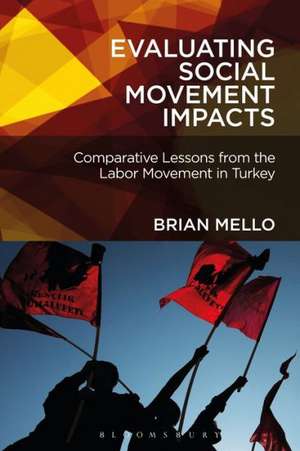Evaluating Social Movement Impacts: Comparative Lessons from the Labor Movement in Turkey
Autor Dr. Brian Melloen Limba Engleză Hardback – 9 oct 2013
| Toate formatele și edițiile | Preț | Express |
|---|---|---|
| Paperback (1) | 255.58 lei 6-8 săpt. | |
| Bloomsbury Publishing – 25 feb 2015 | 255.58 lei 6-8 săpt. | |
| Hardback (1) | 771.36 lei 6-8 săpt. | |
| Bloomsbury Publishing – 9 oct 2013 | 771.36 lei 6-8 săpt. |
Preț: 771.36 lei
Preț vechi: 1111.50 lei
-31% Nou
Puncte Express: 1157
Preț estimativ în valută:
147.62€ • 153.55$ • 121.87£
147.62€ • 153.55$ • 121.87£
Carte tipărită la comandă
Livrare economică 14-28 aprilie
Preluare comenzi: 021 569.72.76
Specificații
ISBN-13: 9781441184283
ISBN-10: 1441184287
Pagini: 192
Dimensiuni: 152 x 229 x 18 mm
Greutate: 0.39 kg
Ediția:New.
Editura: Bloomsbury Publishing
Colecția Bloomsbury Academic
Locul publicării:New York, United States
ISBN-10: 1441184287
Pagini: 192
Dimensiuni: 152 x 229 x 18 mm
Greutate: 0.39 kg
Ediția:New.
Editura: Bloomsbury Publishing
Colecția Bloomsbury Academic
Locul publicării:New York, United States
Caracteristici
Develops a framework for analysis based on movement impacts rather than successes or failures
Notă biografică
Brian Mello is Associate Professor of Political Science at Muhlenberg College, USA. His research focuses primarily on politics in the Middle East. He has published articles that focus on self-determination as a human right in the journal Social Theory and Practice and on the emergence of radical labor activism in Turkey in the journal Social Movement Studies
Cuprins
List of AbbreviationsAcknowledgementsPrefaceChapter 1 - Introduction: The Impact of Alternative Collective SubjectivitiesChapter 2 - Collective Subjectivity and Divergences in the Shaping of State-Labor Relations in Great Britain and the United StatesChapter 3 - Dreams of Solidarity: Populism and State-Building without Class AntagonismChapter 4 - Recognition and Redistribution: The Politics and Impact of Labor Insurgency in Turkey, 1960-1980 Chapter 5 - Democracy and Economic Justice: Labor Activism and Contemporary Turkish Politics Chapter 6 - Japan, Turkey, and the Comparative Analysis of Social Movement Impacts BibliographyIndex
Recenzii
The book is highly readable and insightful - indeed, a must-read - and highly recommended for scholars, graduates and those interested in social and labour movements, as well as those interested in Turkish political history.
An elegant and extremely important contribution to the study of social movements and why they matter, even when they appear to fail. Mello deftly links theories on labor activism, state-society relations, and collective identity to offer us an original, startlingly compelling, and very widely applicable approach to evaluating movement impacts.
Brian Mello has crafted an original study that is accessible and informative as well as provocative. He uses the comparative histories of labor movements to understand how national political identities evolve, and ingeniously compares two cases of labor history that already well-known to Western scholars with two cases with which most Western scholars are fairly ignorant. The result is a refreshing comparative social-movement study that exposes the reader to new information while exploring the on-going debate about when and how movements matter.
In the best tradition of comparative analysis, Dr. Mello's book examines several labor movements and their impacts on different political systems. In all his case studies, the author convincingly demonstrates the very significant impact that even unsuccessful labor movements had in shaping politics and society in their respective contexts. In Turkey, for example, observers generally view the labor movement as a failure-but Dr. Mello shows how the very struggles that Turkish labor movements evoked ended up shaping social discourse and politics for decades to come. Even Kurdish nationalism in Turkey has its roots in the Turkish labor movement and the state's response to the movement. Through analytical concepts such as 'alternative collective subjectivities,' Dr. Mello shows us how and why this occurred, in perceptive prose that I think readers will greatly appreciate.
An elegant and extremely important contribution to the study of social movements and why they matter, even when they appear to fail. Mello deftly links theories on labor activism, state-society relations, and collective identity to offer us an original, startlingly compelling, and very widely applicable approach to evaluating movement impacts.
Brian Mello has crafted an original study that is accessible and informative as well as provocative. He uses the comparative histories of labor movements to understand how national political identities evolve, and ingeniously compares two cases of labor history that already well-known to Western scholars with two cases with which most Western scholars are fairly ignorant. The result is a refreshing comparative social-movement study that exposes the reader to new information while exploring the on-going debate about when and how movements matter.
In the best tradition of comparative analysis, Dr. Mello's book examines several labor movements and their impacts on different political systems. In all his case studies, the author convincingly demonstrates the very significant impact that even unsuccessful labor movements had in shaping politics and society in their respective contexts. In Turkey, for example, observers generally view the labor movement as a failure-but Dr. Mello shows how the very struggles that Turkish labor movements evoked ended up shaping social discourse and politics for decades to come. Even Kurdish nationalism in Turkey has its roots in the Turkish labor movement and the state's response to the movement. Through analytical concepts such as 'alternative collective subjectivities,' Dr. Mello shows us how and why this occurred, in perceptive prose that I think readers will greatly appreciate.









